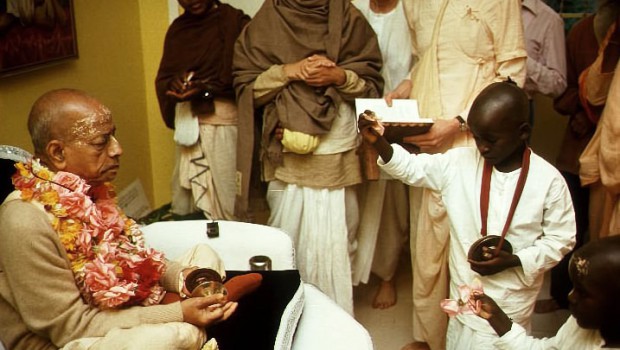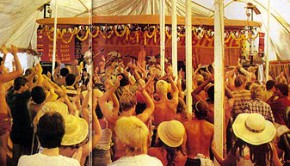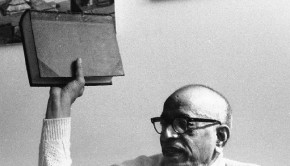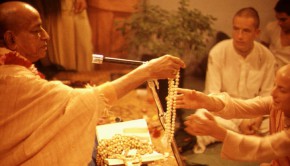The Art of Living (MP3 Audio)
We have to train up the mind until we get the another body. That is the art of living. So if you train up your mind simply to think of Krishna then you are safe. Otherwise there is chance of accident…
Prabhupada:
sri prahlada uvaca
brahmadayah sura-gana munaya ‘tha siddhah
sattvaikatana-gatayo vacasam pravahaih
naradhitum puru-gunair adhunapi pipruh
kim tostum arhati sa me harir ugra-jateh
So ugra-jateh means demonic family, passionate. Ugra. There are three qualities within this material world. Therefore it is said guna-mayi. Daivi hy esa guna-mayi. Guna-mayi means three gunas, three modes of material nature: sattva-guna, rajo-guna and tamo-guna. So our mind is jumping. Everyone knows the nature of the mind, sometimes accepting one thing, again rejecting it, sankalpa-vikalpa. This is the quality of the mind or nature of the mind. Sometimes the mind is jumping over sattva-guna, sometimes on the rajo-guna, and sometime on the tamo-guna. In this way we are getting different types of mentality. In this way, at the time of death the mentality which is just at the moment of leaving this body will carry me to a different body of sattva-guna, rajo-guna, tamo-guna. This is the way of transmigration of the soul. Therefore we have to train up the mind until we get the another body. That is the art of living. So if you train up your mind simply to think of Krishna then you are safe. Otherwise there is chance of accidents. Yam yam vapi smaran bhavam tyajaty ante kalevaram. At the time of leaving this body, if we have not practiced the mind to fix up at the lotus feet of Krsna, then there is… (break) A particular type of body we get.
So Prahlada Maharaja, although he does not belong to this platform of mental speculation… He is nitya-siddha. He has no chance because he’s always thinking of Krsna. (loud electrical noise) (aside:) What is that? Sa vai manah… Sa vai manah krsna-padaravindayor.
Practice this very simple thing. Krsna is here. We see the Deity daily and see the lotus feet of Krsna. Fix up your mind in that way. Then you are safe. Very simple thing. Ambarisa Maharaja, he was also a great devotee. He was king, very responsible person, politics. But he practiced in such a way that he fixed up his mind on the lotus feet of Krsna.
Sa vai manah krsna-padaravindayor vacamsi vaikuntha-gunanuvarnane. This practice. Don’t talk nonsense. (noise again) (aside:) What is the trouble? Take out.
So mahajano yena gatah sa panthah. We can learn Krsna consciousness perfectly well if we follow the mahajanas. Mahajana means great personality who are devotees of the Lord. They are called mahajanas. Jana means person. Just like in ordinary way, in India a person is called mahajana who is very rich. So this mahajana means one who is rich in devotional service. He is called mahajana. Mahajano yena gatah sa panthah. So we have got Ambarisa Maharaja. We have got Prahlada Maharaja. There are many, many kings–Yudhisthira Maharaja, Pariksit Maharaja–they are rajarsi. So Krsna consciousness, actually, it is meant for very great personalities.
imam vivasvate yogam
proktavan aham avyayam
vivasvan manave prahur
manur iksvakave ‘bravit
Evam parampara-praptam imam rajarsayo viduh. Actually, sastra is not for the loafer class. For highly learned brahmanas and highly elevated ksatriyas. And the vaisyas and the sudras, they are not expected to become very learned in sastra, but, being directed by proper brahmana and ksatriya, they are also perfect. The first perfect class, munayo, as it is said, sattvaikatana gatayo munayo, “Great sages…” Generally, “great sages” means brahmanas, Vaisnavas. They are situated on the sattva-guna by devotional service. Rajas, tamo-guna cannot touch them. Nasta-prayesv abhadresu nityam bhagavata-sevaya. The bhadra and abhadra, good and bad… So the rajo-guna and tamo-guna is bad, and sattva-guna is good. If we are situated, as it is said, sattvaikatana-gatayo… If you are always situated on the sattva-guna, then everything is clear to be done. Sattva-guna means prakasa. Everything is clear, full knowledge. And rajo-guna is not clear. The example is given: just like the wood. There is fire, but the first symptom of fire, wood, you’ll find smoke. When you set fire in the wood, first of all smoke comes. So smoke… First of all wood, then smoke, then fire. And from fire, when you engage the fire for fire sacrifice, that is the ultimate. Everything coming from the same source, from earth… The wood is coming from wood, the smoke is coming from smoke, the fire is coming… And fire, when engaged in fire sacrifice–svaha–then it is proper use of fire. If one stays in the wood platform, that is completely forgetfulness. When one stays in the smoke platform, there is little light. When one is staying in fire platform, then full light. And when the light is engaged in Krsna’s service, that is perfect. We have to understand like that.
So Prahlada Maharaja is Vaisnava. Vaisnava qualification is
trnad api sunicena
taror api sahisnuna
amanina manadena
kirtaniyah sada harih
Vaisnava is always humble, meek and humble. That is Vaisnava. Vaisnava is powerful, but still he is very meek and humble. So here is the sign. Prahlada Maharaja is so qualified that immediately Lord Nrsimhadeva put His hand on the head: “My dear child, you have suffered so much. Now be pacified.” This is Prahlada Maharaja’s position–immediately accepted by the Lord. But he’s thinking, “I am so lowborn in the family of passionate family.” Ugra-jateh. He’s not proud that “Now Nrsimhadeva has touched my head. Ah. Who is like me? I am the greatest personality.” This is not Vaisnava. Sanatana Gosvami when he approached Caitanya Mahaprabhu, he presented himself, nica jati nica karma nica sangi: “I am born of very low grade family, and my duties are also very low grade, and my association are also very low grade.” So Sanatana Gosvami was born in a very respectable brahmana family, but because he accepted the service of Muhammadan king, actually he lost his all brahminical culture. He did not lose, but superficially it appeared because he was mixing with the Muhammadans, eating with them, sitting with them, talking with them. But he gave up. Tyaktva turnam asesa-mandala-pati-srenim sada tuccha. He understood, “What I am doing? I am committing suicide.” Janiya suniya visa khainu. Narottama dasa Thakura says that “I am taking poison knowingly.” Unknowingly one may take poison, but if knowingly one takes poison, that is very regrettable. So Narottama dasa Thakura said,
hari hari biphale, janama gonainu
manusya-janama paiya, radha-krsna na bhajiya,
janiya suniya visa khainu
So we are trying to preach this Krsna consciousness movement all over the world, but still, if people do not take to this Krsna consciousness movement, then he is drinking poison knowingly. This is the position. He is drinking poison. That’s a fact. It is not that we are imagining something, eulogizing.(?) They are charging us, “Brainwash.” Yes, it is brainwash. It is… All the dirty things, stools, are there in the brain, and we are trying to wash them. That is our…
srnvatam sva-kathah krsnah
punya-sravana-kirtanah
hrdy antah stho hy abhadrani
vidhunoti suhrt satam
The vidhunoti, this word, is there. Vidhunoti means washing. Washing. As you are hearing the message of Srimad Bhagavatam or Bhagavad-gita, the process is vidhunoti, washing. Actually, it is brainwashing–but for good. Washing is not bad. (laughter) That these rascals, they do not know. They are thinking, “Oh, you are making me purified? Oh, you are very dangerous.” This is their… Murkhayopadeso hi prakopaya na santaye: “To a rascal, if you give good advice, he becomes angry.” Murkhayopadeso hi prakopaya na santaye. How is it? Payah-panam bhujanganam kevalam visa-vardhanam. A snake-quality man is very dangerous. Canakya Pandita has said,
sarpah krurah khalah krurah
sarpat kruratarah khalah
mantrausadhi-vasah sarpah
khalah kena nivaryate
“There are two envious living entities. One is a snake, black snake, and one is a human being with the quality of black snake.” He cannot see any good thing. Sarpah krurah. The snake is envious. Without any fault he bites. A snake is there on the street, and if you happen to pass by him he becomes so angry, immediately he bites. So this is the snake’s nature. Similarly, there are persons like the snake. Without any fault they will accuse you. They are also snake. So Canakya Pandita says that “This black snake is less harmful than the man snake.” Why? “Now, this black snake, by chanting some mantra or by some herb can bring him under your control. But this man snake you cannot. It is not possible.”
So there will be. This Hiranyakasipu is also described by Prahlada Maharaja as a snake. When Nrsimhadeva is so angry so he will say later on that modeta sadhur api vrscika-sarpa-hatya: “My Lord, You were very much angry on my father. Now he’s finished, so there is no more reason for Your remaining angry.
Be pacified. Nobody is unhappy for killing my father. Be sure. So there is no cause of anguish. These all these demigods, Lord Brahma and others, they are all Your servants. I am also Your servant’s servant. So now the envious snake is killed. Everyone is happy.” So he gave this example that modeta sadhur api vrscika-sarpa-hatya. A sadhu, a saintly person, never likes killing of any living being. They are not happy… Even a small ant is killed, they are not happy: “Why ant should be killed?” What to speak of others, even a small ant. Para-duhkha-duhkhi. It may be an ant, insignificant, but at the time of death he has suffered. A Vaisnava is unhappy: “Why an ant should be killed?” This is para duhkha-duhkhi. But such Vaisnava is happy when a snake and a scorpion is killed. Modeta sadhur api vrscika-sarpa-hatya. So everyone is happy when a snake or scorpion is killed because they are very, very dangerous. Without any fault they bite and create havoc.
So there are these snakelike persons. They are envious about our movement, and they are opposing. That is the nature. Prahlada Maharaja also was opposed by his father, what to speak of others. These things will happen, but we should not be disappointed, as Prahlada Maharaja never became disappointed although he was teased in so many ways. He was also served with poison, he was thrown amongst the serpents and he was thrown from the hill, he was put under the feet of elephant. In so many ways put… Therefore Caitanya Mahaprabhu has instructed us that “Do not be disappointed. Kindly forbear.” Trnad api sunicena taror api sahisnuna. Be tolerant more than the tree. I mean to say, one shall be meek and humble more than the grass. These things will happen. In one life if we execute our Krsna consciousness attitude, even there is suffering little, don’t mind. Go on with Krsna consciousness. Don’t be disappointed or hopeless, even there is some trouble. That is encouraged by Krsna in Bhagavad-gita: agamapayino ‘nityas tams titiksasva bharata: “My dear Arjuna, even if you feel some pain, this bodily pain, it comes and goes. Nothing is permanent, so don’t care for these things. Go on with your duty.” This is the instruction of Krsna. Prahlada Maharaja is the practical example, and our duty is to follow the footprints of such person like Prahlada Maharaja.
So Prahlada Maharaja, such an exalted personality, the authority, he is so humble, he says, kim tostum arhati sa me harir ugra-jateh: “I am born in a very ferocious family. Certainly I have inherited the quality of my father, my family, demonic family. And persons like Lord Brahma and other demigods, they could not satisfy the Lord, and what I shall do?” A Vaisnava thinks like that. Vaisnava, Prahlada Maharaja, although he is transcendental, nitya-siddha, he’s thinking, identifying himself with his family. Just like Haridasa Thakura. Haridasa Thakura was not entering in the Jagannatha temple. The same thing, five hundred years ago they did not allow anyone except Hindus in the Jagannatha temple. The same thing is still going on. But Haridasa Thakura never by force entered. He thought himself, “Yes, I am low grade person, born in low grade family. Why shall I disturb the pujaris and others who are directly engaged with Jagannatha? No, no.” Sanatana Gosvami, he did not go near the temple gate. He thought himself, “By touching me, the pujaris will be impure. Better I shall not go.” But Jagannatha Himself was coming to see him daily. This is the position of devotee. Devotee is very humble. But to prove the devotees’ quality the Lord takes care of them. Kaunteya pratijanihi na me bhaktah pranasyati.
So we should always depend on Krsna’s assurance. In any circumstances, any dangerous position, Krsna… Avasya raksibe krsna visvasa palana. This is surrender. Surrender means… One of the item is full faith in Krsna, that “In execution of my devotional service there may be so many dangers, but because I have taken shelter of Krsna’s lotus feet, I am safe.” This, this faith for Krsna.
samasrita ye pada-pallava-plavam
mahat-padam punya-yaso murareh
bhavambudhir vatsa-padam param padam
padam padam yad vipadam na tesam
Padam padam yad vipadam na tesam. Vipadam means dangerous position. Padam padam, every step in this material world–na tesam, not for the devotee. Padam padam yad vipadam na tesam. This is Srimad-Bhagavatam. Even from literary point of view so exalted. So Prahlada Maharaja… Just like Kaviraja Gosvami. He is writing Caitanya-caritamrta, and presenting himself, he says,
purisera kita haite muni se laghistha
jagai madhai haite muni se papistha
mora nama yei laya tara punya ksaya
Like that. The author of Caitanya-caritamrta, he presents himself: “The lighter than the worm in the stool.” Purisera kita haite muni se laghistha. And in Caitanya-lila, Jagai-Madhai, two brothers are supposed to be most sinful, but he has also They were also delivered. Kaviraja Gosvami says, “I am more sinful than the Jagai-Madhai.”
jagai madhai haite muni se papistha
mora nama yei laya tara punya ksaya
“I am so low grade that if somebody takes my name, whatever little pious action is there is lost.” In this way he’s presenting. And Sanatana Gosvami, presenting himself, nica jati nica karma nica sanga… They are not artificial. A Vaisnava actually thinks like that. That is Vaisnava. He is never proud of… And just opposite number: “Oh, I have got this. I have got this. Who is equal to me? I am so rich. I am so this and that.” That is the distinction.
So we have to learn this trnad api sunicena taror api sahisnuna and follow the footprint of Prahlada Maharaja. Then surely we shall be accepted by Nrsimhadeva, Krsna, without any failure.
Thank you very much. (end)
[Srimad-Bhagavatam 7.9.8 Mayapur, February 28, 1977]
His Divine Grace A.C. Bhaktivedanta Swami Prabhupada















Wonderful lecture!
There are so, so many wonderful Prabhupada lectures. I have to try and post some more on Krishna.org.
Hare Krishna…
Guru ji,
I am a krishna beliver. Recently i read “bhgavad geeta” and i understand “krishnava bhodha” is the only way to reach inside krishna. Also i am practicing hare krishna..hare rama mantra daily before sleeping and morning also(10 times each). In this time we need money and we need every thing to live with. Please guide me to be success as a “grihasthan” relegiously.